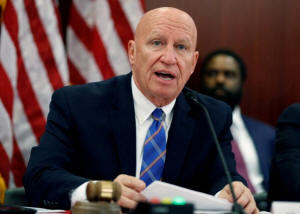|
House Republicans roll out election-year
tax cut plan
 Send a link to a friend
Send a link to a friend
 [July 25, 2018]
By David Morgan [July 25, 2018]
By David Morgan
WASHINGTON (Reuters) - Republicans in the
U.S. House of Representatives unveiled an election-year tax plan on
Tuesday that is unlikely to become law but could energize party voters
this autumn by promising permanent tax cuts for individuals and most
business owners.
Days before lawmakers head home for five weeks of summer campaigning
before the Nov. 6 congressional elections, House Ways and Means
Committee Chairman Kevin Brady rolled out a "Tax Reform 2.0" proposal
that would also expand savings opportunities for families and workers
while expanding write-offs for start-up businesses.
"This is an excellent first step," Brady, a Republican, told reporters
after showing the plan to members of his party.
House Republicans plan three pieces of legislation covering permanence,
savings and business in hopes of reaping some success in the Senate.
Other ideas, including a measure to protect capital gains on business
investments from inflation, are also under discussion.
Brady expects his committee to vote on legislation in September, setting
the stage for a House floor vote.
But new tax legislation is unlikely to succeed in the Senate, where
Republicans would need support from Democrats, who opposed last year's
overhaul that permanently slashed corporate taxes but provided only
temporary reductions for individuals and business owners.
Democrats charged that the tax law largely benefited wealthy Americans
and corporations.

Some $1.1 trillion of the cuts will expire after 2025, a factor
contributing to the overhaul's unpopularity with voters, according to
polling.
"Don't expect the sequel to be any better than the original. More of a
bad idea is still a bad idea," said Representative Lloyd Doggett, a
Democrat on Brady's committee.
But Republicans hope new legislation could appeal to voters, while
helping focus the congressional election campaign on buoyant economic
growth, rather than President Donald Trump's trade wars, immigration
policy and federal probes into Russian election meddling.
[to top of second column]
|

Chairman of the House Ways and Means Kevin Brady (R-TX) speaks at
the start of the House-Senate Conferees conference meeting on the
"Tax Cuts and Jobs Act" on Capitol Hill in Washington, U.S.,
December 13, 2017. REUTERS/Joshua Roberts/File Photo

"Voters like tax cuts. I don't know of too many people who say:
'Raise my taxes.' It's what the people want. They want to keep their
money," said Representative Scott DesJarlais.
But some Republicans are concerned about adding hundreds of billions
of dollars more to the federal deficit, and the new plan offers no
way to pay for an extension of the cuts.
Additionally, the proposal would create "fully flexible" Universal
Savings Accounts for families, allow education savings to be spent
on apprentice fees and give new parents penalty-free access to
retirement accounts for child expenses.
It also calls for allowing start-up companies to write off more of
their initial costs as a way to foster innovation and productivity.
While Senate action is unlikely before the November elections, the
Senate could use a House measure during the post-election lame-duck
session as a vehicle for bipartisan legislation to address
provisions of the 2017 overhaul that have had unintended effects,
including higher-than-expected tax bills for some corporations.
(Reporting by David Morgan; Additional reporting by Lisa Lambert;
Editing by Bill Trott and Peter Cooney)
[© 2018 Thomson Reuters. All rights
reserved.]
Copyright 2018 Reuters. All rights reserved. This material may not be published,
broadcast, rewritten or redistributed.
Thompson Reuters is solely responsible for this content. |